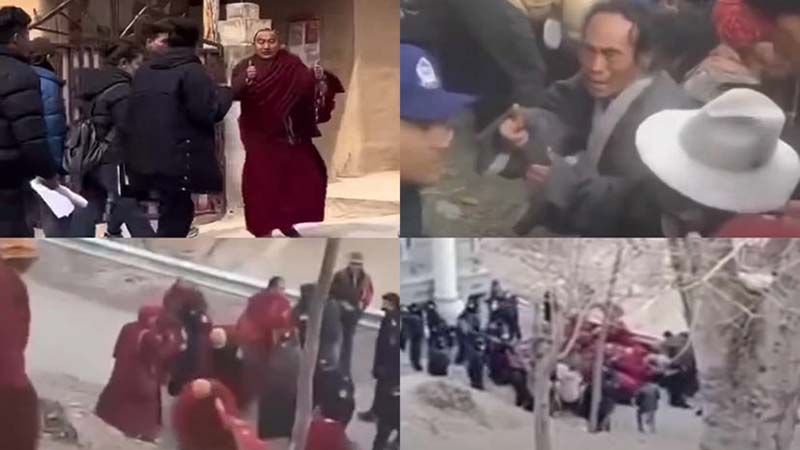Dharamshala – Hundreds of Tibetans asked and begged the Chinese authorities to halt the construction of the Kamtok dam on the Drichu River in the Gege region. That way, they would not have to relocate their centuries-old monasteries and beloved homes. However, instead of listening to the Tibetans, the Chinese police and army arrested hundreds of Tibetans and severely beat them.
Chinese authorities plan to build the Kamtok (Ch:Gangtuo) dam on the Drichu River (Jinsha River in Chinese) without the Tibetans' consent to dam construction and resettlement, and have ordered Tibetans and monks from six monasteries and two villages in the Dege County, Kham, eastern Tibet, to resettle in other villages. Therefore, around 300 Tibetans gathered in front of the Dege county government building on February 14, 2024, to protest against this action and to ask the concerned authorities to put an end to it.
Tibetans in the two villages and Tibetan monks in the six monasteries are deeply disturbed to learn that the Chinese authorities have ordered them to move their beloved homes and centuries-old monasteries due to the construction of a mega-dam in their area on the Drichu River. The villages affected are Upper Wonto and Shipa, as well as the six monasteries, including Yena monastery, Wonto monastery, and Khardho monastery in, and Rabten monastery, Gonsar monastery and Tashi monastery.
Videos circulated on February 21, 2024 showing Tibetans and monks on their knees, crying and asking the Chinese authorities to stop the dam construction plan and order the resettlement of villages and monasteries.
According to the sources, the Chinese authorities brought a specially trained police force to the Wonto village area on February 22, 2024 and arrested more than 100 Tibetan monks from the Wonto and Yena monasteries, as well as local residents, many of whom were beaten and injured before being admitted to Dege County Hospital for treatment.
After peaceful protests by Tibetans and Tibetan monks continued from 14 to 22 February, 2024, the Chinese government sent in trained special forces to arrest the demonstrators. Tibetans working outside their villages returned home and asked the Chinese police to release the detained Tibetans. Unfortunately, the Chinese police arrested those who had made this request and detained more than 1,000 Tibetans on Feb 23, 2024, including Tibetan monks, local Tibetans and Tibetans from outside the villages. The police have asked family members to bring Tsampa-Tibetan food and blankets to the detention centres, as they do not have enough food for large numbers of detainees.
Tibetans around the world, from the United States to Canada, Europe and India, have protested against the Chinese government's beating and arrest of Tibetans in Dege, Kham,Tibet, for their peaceful protest against the construction of a mega-dam and for forcibly ordering the relocation of six Tibetan monasteries and two villages in Dege County. Tibetans in exile expressed their deep concern about the unfair treatment of detained Tibetans. They also expressed their solidarity with Tibetans detained in Chinese-occupied Tibet.
U.S. special coordinator for Tibetan Issues, wrote on X on Feb, 25, 2024, "Deeply concerned by reports of the PRC’s mass arrests of Tibetans protesting construction of a dam that threatens displacement of villages & destruction of monasteries. China must respect human rights & freedom of expression and include Tibetans in the development & implementation of water and land management policies."
Sikyong Penpa Tsering, the President of the Central Tibetan Administration, said, “The crackdown on non-violent protests in Derge is beyond condemnation. The Chinese authorities’ disregard for the rights of Tibetans is unacceptable by any measure. The punitive acts demonstrate China’s prioritization of its ideology and interests over human rights. We call on the Chinese government to release all those detained and to respect the rights and aspirations of the Tibetan people. The world needs to hear the Tibetans’ voices and confront the truth of Chinese misrule in Tibet.”
China-Tibet: The one-thing you need to know
Over the past 70 decades, there has been ongoing political repression, social discrimination, economic marginalization, environmental destruction, and cultural assimilation, particularly due to Chinese migration to Tibet which is fueling intense resentment among the people of occupied Tibet.
The communist-totalitarian state of China began its invasion of Tibet in 1949, reaching complete occupation of the country in 1959. Since that time, more than 1.2 million people, 20% of the nation's population of six million, have died as a direct result of China's invasion and occupation. In addition, over 99% of Tibet's six thousand religious monasteries, temples, and shrines, have been looted or decimated resulting in the destruction of hundreds of thousands of sacred Buddhist scriptures.
Until 1949, Tibet was an independent Buddhist nation in the Himalayas which had little contact with the rest of the world. It existed as a rich cultural storehouse of the Mahayana and Vajrayana teachings of Buddhism. Religion was a unifying theme among the Tibetans -- as was their own language, literature, art, and world view developed by living at high altitudes, under harsh conditions, in a balance with their environment.


![Tibet has a rich history as a sovereign nation until the 1950s when it was invaded by China. [Photo: File]](/images/stories/Pics-2024/March/Tibet-Nation-1940s.jpg#joomlaImage://local-images/stories/Pics-2024/March/Tibet-Nation-1940s.jpg?width=1489&height=878)


















